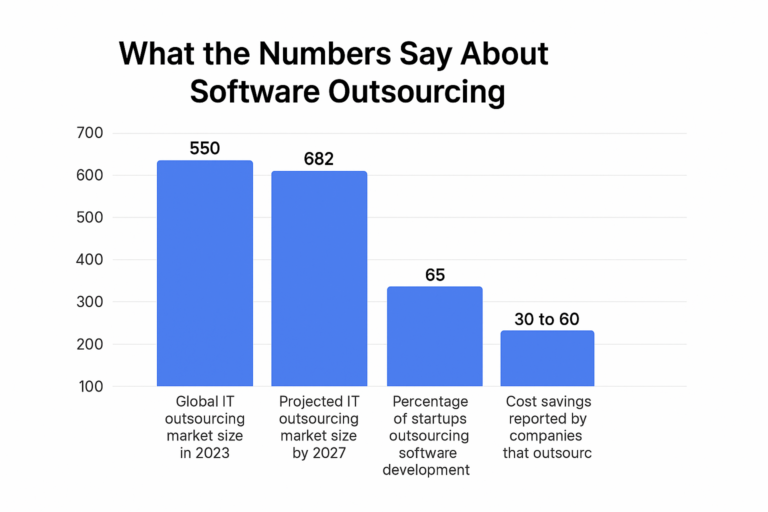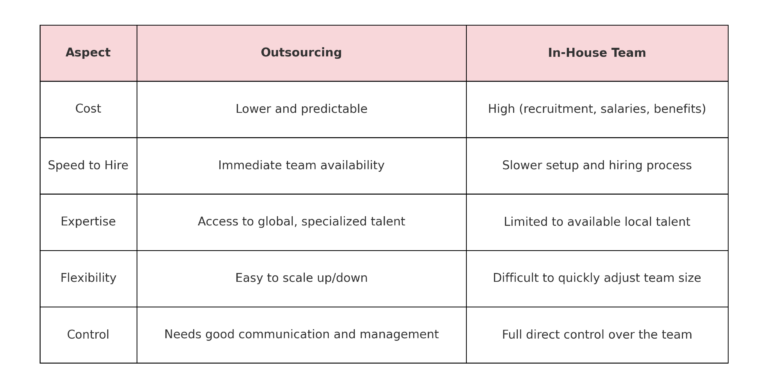As companies grow, they face an increasingly complex set of challenges: building great products, scaling technology, maintaining budgets, and keeping customers happy. Balancing all of these demands with a small or overstretched team is risky.
That’s why more and more businesses from early-stage startups to fast-scaling companies turn to software outsourcing.
Outsourcing provides immediate access to global talent, accelerates delivery cycles, saves costs, and enables companies to focus on their true value proposition.
Let’s dive deeply into why software outsourcing isn’t just a convenience it’s a strategic imperative for growth.
Reasons for Software Outsourcing Development for Startups
Startups are resource-strapped but dream-driven. Here’s why outsourcing often becomes a key lever in their growth journey:
Cost-Effective Access to Global Talent:
Building a strong tech team in major tech hubs like Silicon Valley, London, or Berlin is extremely expensive. Salaries, benefits, office space, and taxes quickly add up. Software Outsourcing allows startups to work with highly skilled developers from countries like India, Ukraine, Poland, or Vietnam, where labor costs are significantly lower but quality is still world-class. For example, the average cost of a senior developer in India is approximately $25-$50/hour, compared to $120+/hour in the U.S. This massive cost difference allows startups to stretch their budgets further and invest savings in marketing, customer acquisition, or product research.Rapid Prototyping and MVP Development:
Time is a critical resource. Startups must get a functional product into users’ hands quickly to validate ideas and attract investors. An outsourcing partner that specializes in MVP development can assemble a small, focused team to build a working prototype in weeks rather than months. This rapid cycle of build–test–learn is what drives many startups to early success stories. Think of companies like Slack and WhatsApp, which initially used outsourced development help during their early days.Reduced Operational Burden:
Managing an in-house team isn’t just about hiring developers. It’s also about onboarding, training, payroll processing, providing benefits, offering continuous education, and maintaining HR policies. For a small startup, handling these administrative tasks diverts precious time and energy away from innovation. By outsourcing, startups hand over operational complexity to the vendor and maintain a lean internal structure focused only on high-impact activities.Access to Advanced Technologies:
Emerging technologies such as blockchain, machine learning, AR/VR, and cybersecurity require highly specialized skill sets. Recruiting experts in these fields can take months — time a startup often doesn’t have. Outsourcing to specialized firms gives immediate access to cutting-edge expertise. For example, if a fintech startup needs to implement a secure blockchain payment system, it can partner with an agency that has completed dozens of similar projects.Scalable Team Structure:
Startups move through unpredictable growth stages — sudden surges in demand followed by quieter periods. Outsourcing allows startups to expand or shrink their development team as needed, without the challenges of hiring and firing. Whether it’s ramping up during a major product launch or pulling back post-launch to save costs, outsourcing offers unparalleled team flexibility.
What Do the Numbers Say About Software Outsourcing?

Deeper Insight:
The Software Outsourcing market continues to grow even amidst global economic uncertainty. Companies are realizing that staying lean and nimble, while still building sophisticated technology solutions, is achievable only through strategic outsourcing. Startups especially find it empowering freeing them from the constraints of local talent shortages and bloated payrolls.
What Are the Main Tech Challenges for Startups?
Building technology from scratch is a mountainous task for a startup. Some of the core challenges they face include:
Recruitment and Retention:
Hiring top-tier tech talent is a brutal competition. Startups often can’t match the salaries, stock options, or stability that big tech firms offer. Even when they manage to hire, retaining employees through the ups and downs of early growth is difficult. Constant churn impacts product continuity and drains morale.Technology Choice Overload:
Should you use React or Vue for your front-end? Should you choose AWS, Azure, or Google Cloud for hosting? Early decisions on tech stacks can have long-term consequences on performance, scalability, and maintainability. Making the wrong choices often out of inexperience leads to costly rewrites down the road.Budget Management:
Building robust, secure, and scalable software requires more resources than initially anticipated. Many startups underestimate technical costs, leading to funding shortfalls or abandoned projects. Without financial discipline, tech dreams quickly become financial nightmares.Maintaining Cybersecurity Standards:
Data breaches, especially early in a company’s life, can permanently destroy trust. Implementing secure coding practices, penetration testing, and compliance with regulations (like GDPR) requires expertise startups might not initially have.Building Scalable Architecture:
An MVP that works for 500 users may collapse when traffic spikes to 50,000. Scalability isn’t just about bigger servers; it involves architectural decisions, database design, load balancing, caching strategies, and performance optimization areas where many startups need external guidance.
Outsourcing companies, seasoned in guiding businesses from infancy to maturity, can bridge these gaps seamlessly.
Software Outsourcing vs In-House Team

Benefits of Software Outsourcing for Startups
Here’s why many venture-backed startups including global unicorns choose to outsource parts of their tech development:
Quick Access to Diverse Skills:
Outsourcing companies have specialists in various domains: mobile, backend, frontend, DevOps, QA, cloud infrastructure, and AI. Instead of hunting down five different experts, startups can engage one vendor who assigns appropriate experts as needed.Focus on Core Business:
In the critical early years, a startup’s biggest job is building product-market fit, marketing strategy, and customer loyalty not micromanaging server configurations or API integrations. Outsourcing lifts that burden, allowing founders to stay strategic.Predictable Costs:
Startups need clear financial forecasting to satisfy investors. Outsourcing agreements whether fixed cost or time-and-materials offer greater budget predictability than the uncertainty of full-time salaries, bonuses, and employee benefits.Improved Risk Management:
Reputable outsourcing firms bring established QA processes, documentation practices, and project governance frameworks, reducing operational risks significantly.24/7 Development Cycle:
With teams working across time zones, there’s always someone advancing the project, fixing bugs, or deploying updates reducing time to market dramatically.Opportunity to Pilot Talent:
Outsourcing engagements can act as extended interviews. If collaboration goes well, startups may later choose to convert contractors into full-time employees a much safer bet than hiring blindly.
How Software Outsourcing Supports Startups at Different Growth Stages
Ideation Stage:
Outsourced experts help build clickable prototypes, pitch decks with working demos, and quick technical validations needed for investor conversations.Validation Stage:
Development of MVPs with rapid iterations based on real user feedback. Outsourced teams can quickly build, modify, and retest features.Growth Stage:
Outsourced DevOps teams can help scale infrastructure securely. New feature development (new platforms, integrations, APIs) can happen in parallel streams to accelerate expansion.Expansion Stage:
Localization, compliance (e.g., GDPR for Europe), new language versions, and integrations with local partners all areas where outsourcing offers a strong advantage.Maturity Stage:
Outsourced maintenance teams can manage regular software updates, security patches, performance monitoring, and incident response, freeing internal teams for innovation.
FAQ
Q1: How do I ensure quality when outsourcing?
Quality assurance depends heavily on due diligence when choosing a vendor. Check case studies, conduct technical interviews with their team members, run a paid pilot project, and insist on clear KPIs (Key Performance Indicators) for delivery.
Q2: What regions are best for outsourcing software development?
Eastern Europe (Ukraine, Romania, Poland) offers high engineering quality and cultural proximity to Western Europe. Asia (India, Vietnam, Philippines) is excellent for cost-effectiveness. Latin America (Brazil, Argentina) provides U.S. time zone overlap, ideal for real-time collaboration.
Q3: Will Software Outsourcing compromise my startup’s intellectual property (IP)?
It doesn’t have to. Enforce strict IP clauses in the Master Services Agreement (MSA) and Non-Disclosure Agreements (NDAs). Use trusted legal advisors to review contracts before signing. Also, ensure you have ownership of the code, data, and deliverables clearly stated in the agreement.
Q4: Can I outsource just a part of my project?
Yes, and it is often a smart approach. Many startups outsource modules like UI/UX design, mobile app development, testing, or backend APIs while keeping core business logic or customer data handling in-house.
Q5: How can I align outsourced teams with my startup culture?
Invest in onboarding outsourced developers just like you would for internal hires. Share your mission, product vision, and brand identity. Use daily standups, sprint reviews, collaboration tools like Slack, Jira, and Confluence, and even host virtual social events to build rapport.
Q6: How does outsourcing impact project timelines?
Outsourcing usually accelerates project timelines because experienced vendors bring optimized workflows, reusable frameworks, and dedicated teams. However, success depends on clear communication, thorough project specifications, and a collaborative attitude between both sides.
Q7: Is it more expensive to outsource in the long run?
Not necessarily. While premium outsourcing firms charge higher rates, the savings from reduced hiring costs, faster delivery, and avoiding infrastructure setup typically outweigh those fees. Moreover, you can scale teams flexibly without long-term obligations, reducing financial risks.
Q8: What types of projects are best suited for outsourcing?
Outsourcing works well for projects like MVP development, mobile app creation, website builds, cloud migration, QA and testing, and specialized feature integrations (e.g., payment gateways, AI modules). However, extremely confidential or IP-sensitive projects might be better managed internally.
Q9: How do I manage time zone differences with an outsourced team?
Effective management includes overlapping working hours (at least 2–4 hours daily), using asynchronous communication tools (Trello, Slack, Loom), setting clear deliverables with deadlines, and scheduling regular video calls. Many outsourcing vendors also offer nearshore services to minimize time zone gaps.
Q10: Can an outsourced team become a long-term technology partner?
Yes. Many successful startups build long-term relationships with their outsourcing partners, evolving from project-based engagements to ongoing collaborations involving product scaling, support, maintenance, and even innovation partnerships.
Final Thoughts
In the race to scale, speed and efficiency are everything.
Software outsourcing is not merely about saving money it’s about gaining a competitive edge.
For startups, outsourcing provides breathing room to focus on what truly matters: customers, products, and building a brand that lasts.
